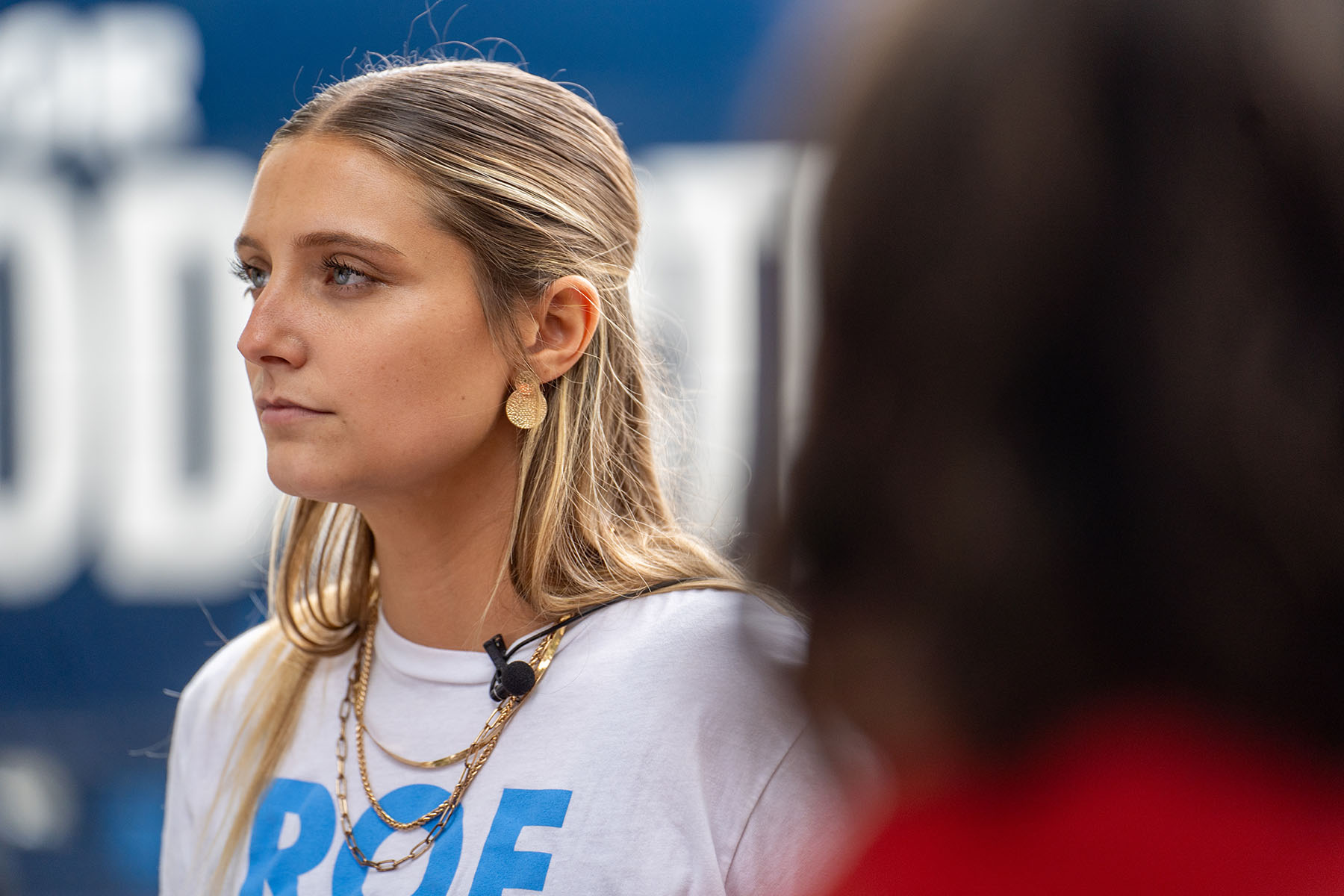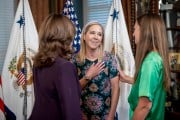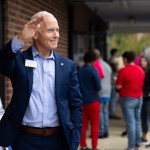This article was co-published with Teen Vogue as part of The 19th News Network’s Abortion on the Ballot series.
Content warning: This story discusses sexual abuse, rape, and incest.
It seems like Hadley Duvall is everywhere. In the weeks leading up to the 2024 election, Duvall was on a Zoom call hosted by Survivors for Harris; she signed her name, alongside 200 survivors of sexual and gender-based violence, to a full-page ad in The New York Times reminding voters that former President Donald Trump was found liable for sexual abuse; and appeared in an online debrief with Representative Fentrice Driskell. She’s campaigned in battleground states like Michigan and Arizona, traveling across the country with the Harris-Walz campaign’s Reproductive Freedom bus tour. Now, she’s returned to where this whole thing began.
On October 24, Duvall headed to Henderson, Kentucky, a neighboring town to where she grew up, for a meet-and-greet for the Harris-Walz campaign. Duvall’s jam-packed past few months as a surrogate for Vice President Kamala Harris’s presidential campaign wasn’t something she could’ve dreamed of a few years ago, and certainly not when she was growing up in Owensboro, where she spent her teen years longing for anonymity. Duvall’s stepfather began sexually abusing her at the age of five, and eventually impregnated her when she was 12 years old, a horrifying story that the now 22-year-old has only opened up about over the past few years. In her small community, everyone knew about the abuse she’d endured. So, telling her story on the national stage was certainly not in Duvall’s plans, particularly when she had been so eager to leave home, escaping the spotlight a small town can shine on you.
But in 2022, shortly after Roe v. Wade was overturned, Duvall couldn’t stay silent. She shared a photo of her 7th grade self on social media, opening up about why losing the federal right to an abortion impacted her directly. While Duvall had a miscarriage after becoming pregnant from her abuser and didn’t require an abortion at that time, she couldn’t stop thinking about were all the people — people like her — whose choices had been stripped away from them.
Duvall opened up about her story even more publicly in a 2023 ad for Kentucky Gov. Andy Beshear as he campaigned against an opponent who, at one time, supported the state’s abortion ban that doesn’t allow exceptions for victims of rape or incest. “This is to you, Daniel Cameron,” Duvall said, looking directly into the camera and addressing Beshear’s opponent in the ad that is credited by some with impacting the outcome of the governor’s race.
“I’m really passionate about helping other survivors and other victims and just doing what I can to help the people who go through what I went through,” Duvall told the Kentucky Lantern at the time.
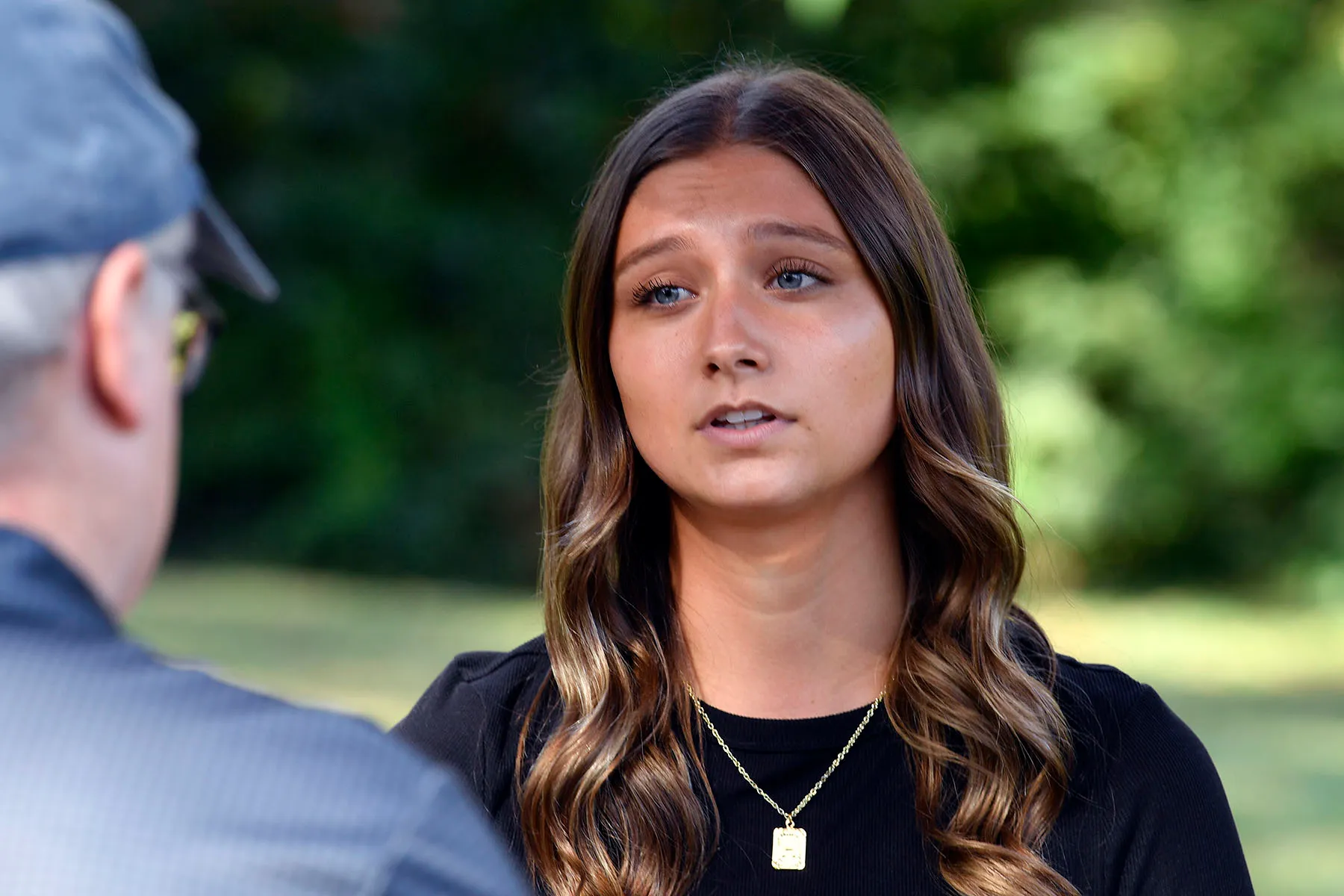
Suddenly, Duvall was a political figure. What started as a need to share her story to help other abuse victims grew quickly into something she never really intended. In fact, at one point, she was adamant about not being political. Where she grew up, she says, you don’t talk about politics, you don’t talk about religion, and everything is kept quiet.
“I honestly have never thought I would be this political, but it’s like — everything in life is political,” she says.
Now, she’s been profiled in The Washington Post, has been the namesake of a proposed amendment to add rape and incest exceptions to Kentucky’s abortion ban (which died in committee), and spoke at the DNC alongside advocates Amanda Zurawski and Kaitlyn Joshua. At a town hall with Harris and Oprah Winfrey, Duvall received a standing ovation as she talked about the “other Hadleys” who might not have access to abortion or reproductive care.
Duvall’s decision to tell her story and step into politics changed the course of her life, even before she became a central part of the Harris-Walz campaign’s effort to reach voters about reproductive rights.
“The things I used to write in my journal …now I’m standing on a stage and speaking it,” she says. She used to be someone who didn’t think politics really applied to her — that they were something people argued over, but that happened in a bubble. Now, she recognizes that she can’t separate her personal life from the policies and elections happening around her, and that no one else can either.
Growing up, Duvall never felt comfortable participating in political discussions. She felt like it wasn’t really her place, that her opinions weren’t “smart enough.” She doesn’t recall learning about politics, or even how laws are made, in school. “So whenever we get out into the real world and it’s time to vote and all this, we’ve never been invited to the table for these conversations,” Duvall says about young people entering the political arena.
She’s not alone in that feeling. According to a 2023 poll from the Center for Information and Research On Civic Learning and Engagement (CIRCLE), only 40% of young people surveyed felt qualified to participate in politics. And for young people growing up in towns like Duvall’s, speaking either personally or politically can feel even more off the table. While red states are not monoliths, nor are the people within them, Owensboro would not necessarily be counted among Kentucky’s left-leaning cities like Louisville and Lexington; Daviess County, where Owensboro is, voted 54% to 46% in favor of an amendment that would’ve stated there is no right to abortion in the state constitution. (Ultimately, Kentuckians voted against the amendment, which would’ve made it harder to challenge abortion restrictions, according to reporting from NPR. Abortion is still banned in Kentucky.)
What prompted Duvall to overcome that feeling of not being smart enough was the realization that her rights were being limited.
“It was really just kind of having that reality check of, well, I didn’t think anything was going to affect me until Roe was overturned,” she says. “So now, what else could potentially affect me?” If her abuse happened now, she could be forced to carry a pregnancy to term. Turning 18 was the first time Duvall felt she was in control of herself, and explained it took awhile after that “to find enough strength to be able to do what I’m doing now.”
-
Read Next:
Still, when political activism means sharing a deeply traumatic story, it can be taxing. That’s why Katima Smith-Willis, a grass-roots activist who works with the ACLU of Kentucky, calls Duvall one of the strongest people she knows.
“Her story is a tough one to swallow,” Smith-Willis says. “Whether you’re a Democrat, or a Republican, or an independent, I think everybody realizes the weight of having to explain that story and the trauma of having to keep retelling it to, not just the world, but to the people that are making these decisions about our bodies.”
Duvall has appeared at Harris events alongside Kaitlyn Joshua, who has shared her story of experiencing a miscarriage in Louisiana after Roe was overturned and is an advocate focusing on abortion rights and maternal health outcomes for Black patients. Glamour called the pair “accidental activists” in their profile of them for the 2024 Glamour Woman of the Year honor. Duvall and Joshua sharing their trauma “may help elect the first woman to the White House and restore abortion rights for all,” Glamour wrote.
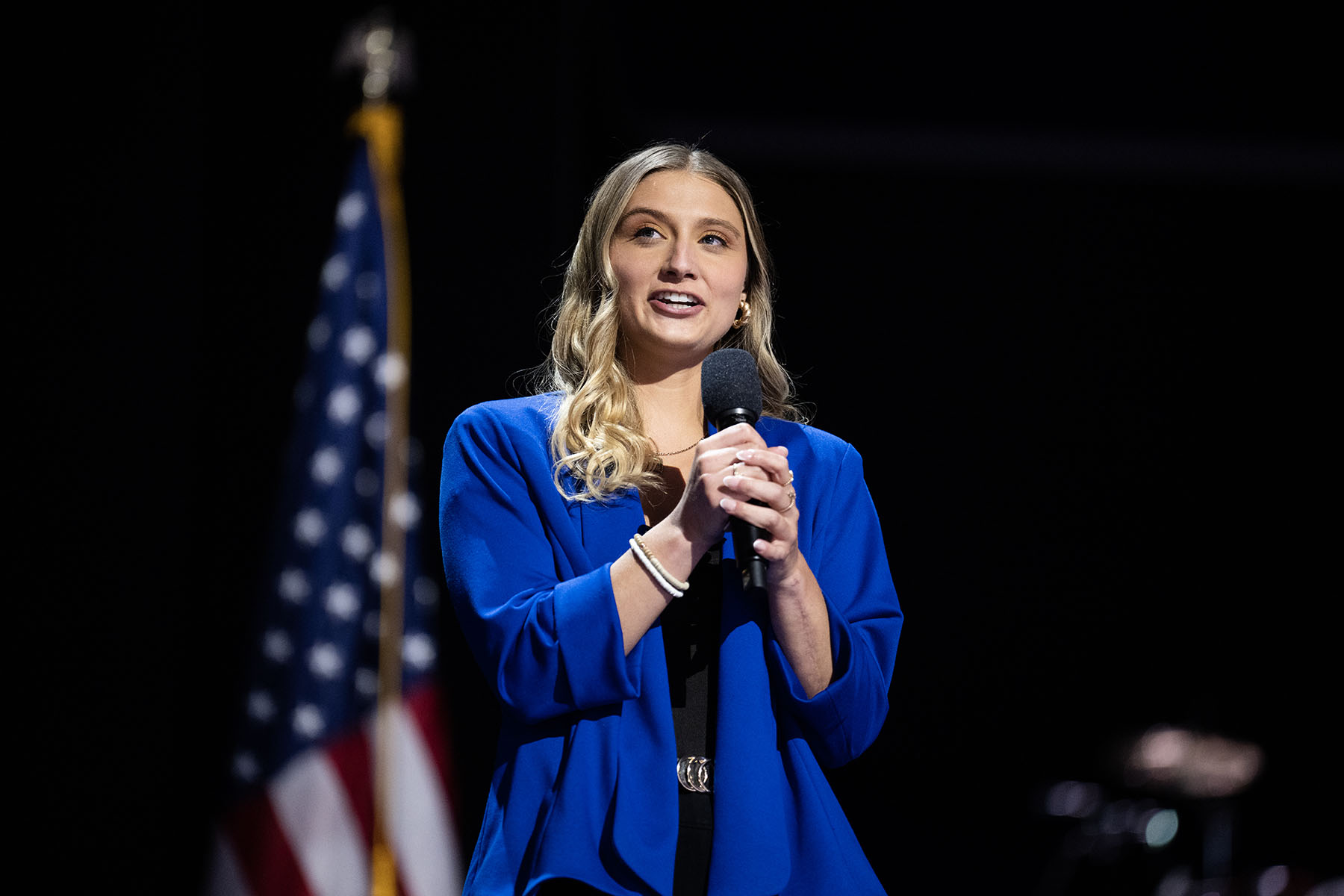
While there is plenty to be said about the expectation that people open their deepest wounds to convince both voters and those in power to care about their well-being and freedom, Duvall is clear that, to her, the decision to share has been her call every step of the way. She thinks back to the post she made, telling her story for the first time, and how people would come up to her and start conversations, since they knew she could provide a safe space.
Now that she’s on the national stage, Duvall says that the slow willingness of more of the public to talk about abortion as more than just a niche issue validates her decision to share her story.
“We cannot expect women to go through something traumatic and bounce back and pretend like nothing happened. We cannot expect women to clean up the pieces when this is not just a women’s issue,” Duvall says about abortion bans. “Seeing some continuing of the normalization of things like abortion and birth control and IVF and having a miscarriage — it’s [a miscarriage] not something to celebrate, of course, but it is something that you shouldn’t have to feel like you can’t talk about.”
Polls show that at least half of men and women, and an overwhelming majority of nonbinary people, support abortion rights. Some lawmakers are speaking publicly about their own abortions, alongside the countless young people who have and will continue to talk about abortion, the need for reproductive health care access. Tim Walz, Harris’s running mate, has also been open about him and his wife using fertility treatments when trying to start their family. This openness can have great impact, as Duvall’s has.
“I remember everything about that morning [the Beshear ad first ran] because it was an ad that completely changed the election,” says Allison Wiseman, president of the Kentucky Young Democrats. Wiseman, who considers Duvall a friend, had goosebumps talking about it, she says, adding that, locally, Democratic candidates are talking more about reproductive health care than they did in 2022. “For me, it changed the landscape of that election in Kentucky. It just changed everything.”
Duvall has grabbed the nation’s ear, but many young people across the country have also shared their stories, advocated for change, and organized support networks for their peers. In red states like Nebraska, young people have lobbied for abortion access and spoken to representatives. Others, particularly young people of color, are organizing for abortion on the ground, including hosting workshops on reproductive justice, working for reproductive health care on campuses, and working with abortion funds and youth-led organizations.
And abortion is an issue young people are voting on. Currently, 41 states have abortion bans at some point during a pregnancy and a potential national abortion ban has been promoted by some Republicans. In a survey from KFF, about two in five of surveyed young voters said abortion was their top concern, with a separate poll from Change Research showing three in four young voters surveyed believe abortion should be legal in all or most cases, and that views on abortion are a “vote motivator” for over half of young voters. As president, Harris says she will not allow a national abortion ban to become law, and if Congress passes a bill to restore reproductive freedom (though it seems unlikely to do so), she’ll sign it. Harris has also supported ending the filibuster in the Senate in order to bring back protections for abortion.
In contrast, Trump celebrated overturning Roe v. Wade, believes that abortion should be left up to the states, and has flip-flopped repeatedly on whether he’d enact a national abortion ban. This year, up to 10 states will pose ballot measures to voters that could expand or protect abortion access, including Nebraska, Florida, and Arizona.
“It’s not just abortion,” says Julian Bernhardt, the 22-year-old communications director for Arizona Students’ Association (ASA). ASA has endorsed Proposition 139, which Arizona for Abortion Access says would establish a fundamental right to abortion. (The Harris campaign’s bus tour is focused on battleground states, including Arizona.) Arizona currently has a 15-week ban, which Bernhardt says stands to impact all of the state’s residents. “Reproductive justice is something that impacts young people significantly,” Bernhardt says. “It doesn’t matter how you identify, it’s going to impact you.”
Bernhardt, who uses all pronouns, got involved in the fight for reproductive justice after he was sexually assaulted. They are not someone who has the ability to get pregnant, but saw the lack of contraceptive care on campuses as an equity issue. When Roe was overturned, Bernhardt says, white women knew, many for the first time, that their rights were under attack. But as a member of the Latiné community, Bernhardt says that reproductive justice has long been a fight for women of color and gender nonconforming people. Abortion bans disproportionately harm people of color, and it is people of color, Black women specifically, who have historically led movements for reproductive justice.
The conversation also doesn’t end with abortion bans, she adds. That also connects to bans on gender-affirming care. When they’re talking about anything, or door-knocking, or are at events, they’re making sure to center those directly impacted by issues.
“The government should not be telling you what to do with your body,” they say.
Meanwhile, in Kentucky, Annabel Nagel, 21, says that in national and statewide elections, abortion is her big concern, adding that “abortion is always on the ballot.” Earlier this year, Nagel traveled out of state for abortion care. The few people she’d told she was pregnant had encouraged her to keep it quiet; at the time, she says, there was talk of legislation that would criminalize anyone crossing state lines for an abortion (no such legislation exists at the state level, though some towns in Texas have tried to stop residents from traveling for care). “And I was like, okay, but what if I’m not quiet about it?” she says. Nagel documented the experience, including the nine hours of travel and protestors outside the clinic.
“I’m just posting it to make everyone feel like this isn’t a bad thing to get done,” she says. Instead, she says, it’s a completely normal occurrence people go through every day, whether it’s legal or not.
Nagel sees her own story and Duvall’s situations as completely different, but both center around reproductive rights. She’d love it if people would start more of these conversations. They don’t have to be as public with their stories as Duvall, or even as public as Nagel herself, she says, but just talking in smaller circles is helpful. “I really think these are the conversations that need to be happening and need to keep people on their toes about what is on the line here in November,” she says.
Recently, Duvall thinks about if she’d seen someone like herself on TV– someone telling this story openly, someone who went on to be a college graduate who gets to decide her path in life. Would she have felt comfortable enough to have a conversation with somebody she trusted about what was happening to her? “I don’t know for sure, but probably,” she tells Teen Vogue. “So I just like to be what I was searching for when I was younger.”
She thinks that, in part because of social media, people are able to “live a little bit freer as kids and [be a] little more open-minded and speak up a little bit more in those households.” Her generation, she says, is willing to have hard conversations—and starting those discussions is good. Even in Kentucky, there are people who use Duvall’s presence and story as an entry point to talk with loved ones about abortion, and to share their own experiences, too. And as Duvall points out, it’s not about what impacts just one person or just one political party: “At this point, it’s not even about your political party, it’s just about basic human rights.”
It’s a mission Duvall holds close, but there are times it gets overwhelming, when she needs to take a mental health day, or to just turn her phone off, not do interviews like this one, and have a moment to herself. Duvall prioritizes her relationship, her dog (who has made appearances on Duvall’s TikTok, yearning to participate in her human’s self-care activities), her regular job as a server in Kentucky, and showing up for the people in her life who have always shown up for her. Because if the personal is political, the political is also about a person. “Because I’m still Hadley, I’m still 22, I’m growing up still,” she says.
Duvall may be an “accidental activist,” but that’s kind of the whole point. It’s surprising, she says, for people to be so surprised at how common versions of her situation are, “and to fail to realize that I could really be anybody.”
